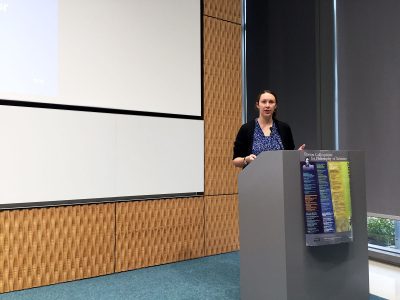
A century after mathematician Amalie Emmy Noether created theorems in abstract algebra and theoretical physics, scholars from across the country gathered in Boston to discuss her legacy. In the 59th annual Boston Colloquium for Philosophy of Science, Noether’s lasting impacts on math and science were honored.
Boston University’s Center for Philosophy and History of Science and the Department of Physics co-sponsored the colloquium. The lecture titled “100 Years of Emmy Noether’s Theorems” was held Friday in the Rajen Kilachand Center for Integrated Life Sciences and Engineering and was free to the public.
According to CPHS, the colloquium consists of several programs that highlight different concepts or historical figures and encourages interdisciplinary approaches to the sciences and humanities. The first talk was held Oct. 19, and the final lecture will take place April 25, 2019.
Katherine Brading, a professor of philosophy at Duke University, and Colin McLarty, chair of philosophy at Case Western Reserve University, spoke at the lecture.
They were joined by Marian Gilton, a doctoral student at University of California Irvine, and Daniel Harlow, an assistant professor of physics at the Massachusetts Institute of Technology.
According to Brading, who presented a lecture titled “How it all Began: The Puzzle that Led to Noether’s Theorems,” Noether’s findings have applications in quantum theory and relativity and connect symmetries with laws in theoretical physics.
In the 1910s, Noether worked with mathematicians David Hilbert and Felix Klein, who were interested in Albert Einstein’s newly developing theory of general relativity, according to Brading.
Brading explained that Hilbert and Klein had approached Noether for help with puzzles they had, and she formulated her theorems by working on these tasks.
“She did what she did best, from what I understand of her as a mathematician, which is that she looked at everything that was going on in the puzzle and situated it in a very mathematical framework, which enabled it to have these wider applications,” Brading said.
Because she was a Jewish woman in Germany following World War II, Noether could only give lectures under Hilbert’s name. Like many women throughout history, Brading said, Noether did not receive the recognition she deserved during her life.
“It’s good that we celebrate these things, especially when the person didn’t get remembered the way she should have been at the time,” Brading said.
According to Brading, many aspects of society are affected by science and technology, so it is important to understand the events that lead to these advancements. For this reason, she said studying the philosophy and history behind math and science is essential.
“Science doesn’t fall down out of the sky fully formed,” she said. “It’s a human activity, and just like music and art and other things, it’s a part of our cultural inheritance.”
In McLarty’s lecture, titled “The Conservation Theorems as Integral to Noether’s ‘True Mathematical Path,’” he agreed that Noether deserves proper recognition for her contributions.
“People sometimes call her the greatest woman mathematician,” McLarty said. “You didn’t really have to say woman there. She’s one of the great 20th century mathematicians.”
According to McLarty, Noether classified exactly how many conservation laws any mathematical description of a physical system could have. She also helped make abstract algebra the basis of several branches of math, such as geometry and number theory, McLarty explained.
“What made her great was not the particular problems she solved, but that she saw a bunch of methods that she believed people should all be using because they give really easy approaches to lots of things,” McLarty said.
Though Noether made profound discoveries, McLarty said she never earned a salary for her work. However, McLarty said he believes she should be remembered for more than her career.
“When we remember Emmy Noether as a woman who was treated badly, sometimes we forget her life,” McLarty said. “She was a radical socialist. She was a pacifist. She was passionate about a lot. I want people to understand her as this giant intellect, not only as a mathematician, because she wasn’t only that.”
Simrita Dhulekar, a freshman in the College of Engineering, said she thinks women should be continually encouraged to pursue careers in science, technology, engineering and math today.
“Although women make up half of the world’s population, they are underrepresented in the science and engineering fields,” Dhulekar said. “Due to the large gender gap in the STEM field, women feel as if they don’t belong. However, the STEM field is about being innovative, creative, passionate and intelligent.
“The interesting and cool ideas women have must be represented.”



























































































































